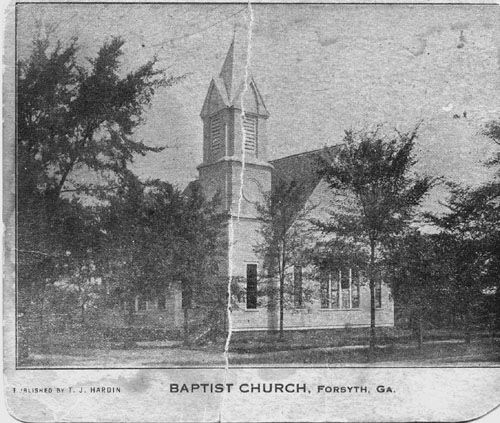 “These days are fraught with many blessings,” Julia Stanford, a teacher in Forsyth, Georgia comments this week. “Would that we had heart to appreciate them – Truly the lines have fallen in pleasant places. God’s ways are far above our poor ways.”
“These days are fraught with many blessings,” Julia Stanford, a teacher in Forsyth, Georgia comments this week. “Would that we had heart to appreciate them – Truly the lines have fallen in pleasant places. God’s ways are far above our poor ways.”
Against the backdrop of distant battlefields and a cloudy, rainy week at home, Stanford’s musings – perhaps like many home front Baptists in the South – range from the theological to the mundane.
Of distant battlefields and uncertainty about the fate of her loved one in uniform: “Would it be that Heaven might spare lives so dear. Still I hope and try to be content with the dispensations of Him who doeth all things well.”
Stanford is fascinated by Rev. Benjamin Murrow, a missionary to the Creek Indians, who speaks at First Baptist Forsyth. Of his lectures she observes: “Truly interesting. Related many customs of the Redmen. Told much of their history & c. Sufferings of Missionaries – Their political tenets – Superstitions. Many rulers – Injustice at the hands of the pale face.” And “At present there are 7 laborers in a field 20000 miles larger than Ga. And yet from the Red men comes the cry, come over and help us. Oh that men would go. God had done so much for us and we do little for him. O, that I could love him more & more.”
And the ever-present rain, days on end: “Falling weather”; “Weather still bad”; “Clouds dark and lowering”; “Rain! Rain! and still it rains!”; “And still the rain is falling”.
What is there to do during the rainy weather, other than listening to Murrow’s lectures? “Hard days sewing.”; attending to domestic duties; “Made pickles and Tomato Catchup – Ought to make some preserves – Have fine Piemelons.”; “Secured my room & hall.”; remembering “Pleasant memories of dear friends.”
And, of course, Bible reading: “Read my Bible and find that David gives thanks for skill in war – They why not we? …. We need more religion – More love to God – and to our neighbors.”
Talk of weather, religious utterances, and duty to chores and other household tasks are echoed throughout the South this week in white Baptist households, mingled with worries about loved ones in uniform far from home. Stanford’s fascination with and verbalized compassion for Indians is not uncommon among white Baptists, contrasted with disdain for and fear of African slaves. Home front hardships lie ahead for white southern families, but for now the normalcies of life yet available are appreciated, while Southern Baptists want to believe that missionary work among Indians and on foreign fields will not be unduly affected.
For white Baptists, many hopes held today, however, are destined to be dashed by war’s end. And for black Baptists, what little hope they cling to today amidst enslavement will flower to joys now only distantly imagined.
Source: “The Diary of Miss Julia A. Stanford” (A copy is available in the Mercer University Georgia Baptist History Depository, Macon, Georgia)


